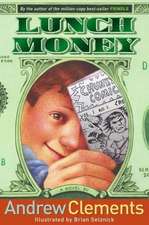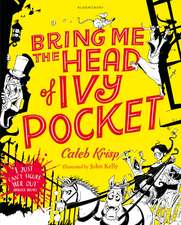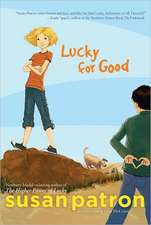Frindle
Autor Andrew Clements Ilustrat de Brian Selznicken Limba Engleză Hardback – 30 sep 1996 – vârsta de la 8 până la 12 ani
Vezi toate premiile Carte premiată
Young Reader's Choice Award (1999), California Young Reader Medal (2000), Rebecca Caudill Young Readers Book Award (1999)
This quirky, imaginative tale about creative thought and the power of words will have readers inventing their own words. Brian Selznick's black-and-white illustrations enhance the humor in this unforgettable story.
| Toate formatele și edițiile | Preț | Express |
|---|---|---|
| Paperback (2) | 42.04 lei 3-5 săpt. | |
| Atheneum Books for Young Readers – feb 1998 | 42.04 lei 3-5 săpt. | |
| Atheneum Books for Young Readers – 16 feb 2022 | 56.95 lei 3-5 săpt. | +7.46 lei 7-13 zile |
| Hardback (1) | 105.55 lei 3-5 săpt. | |
| Atheneum Books for Young Readers – 30 sep 1996 | 105.55 lei 3-5 săpt. |
Preț: 105.55 lei
Nou
Puncte Express: 158
Preț estimativ în valută:
20.20€ • 21.14$ • 16.71£
20.20€ • 21.14$ • 16.71£
Carte disponibilă
Livrare economică 15-29 martie
Preluare comenzi: 021 569.72.76
Specificații
ISBN-13: 9780689806698
ISBN-10: 0689806698
Pagini: 112
Dimensiuni: 148 x 218 x 17 mm
Greutate: 0.24 kg
Ediția:10 ANV
Editura: Atheneum Books for Young Readers
Locul publicării:New York, NY
ISBN-10: 0689806698
Pagini: 112
Dimensiuni: 148 x 218 x 17 mm
Greutate: 0.24 kg
Ediția:10 ANV
Editura: Atheneum Books for Young Readers
Locul publicării:New York, NY
Descriere
Nicholas Allen has plenty of ideas. Who can forget the time he turned his third-grade classroom into a tropical island, or the times he fooled his teacher by chirping like a blackbird? But now Nick's in fifth grade, and it looks like his days as a troublemaker are over. Everyone knows that Mrs. Granger, the language arts teacher, has X-ray vision, and nobody gets away with anything in her classroom. To make matters worse, she's also a fanatic about the dictionary, which is hopelessly boring to Nick. But when Nick learns an interesting tidbit about words and where they come from, it inspires his greatest plan yet: to invent a new word. From now on, a pen is no longer a pen -- it's a "frindle." It doesn't take long for "frindle" to take root, and soon the excitement spreads well beyond his school and town. His parents and Mrs. Granger would like Nick to put an end to all this nonsense. But "frindle" doesn't belong to Nick anymore. All he can do now is sit back and watch what happens. This quirky, imaginative tale about creative thought and the power of words will have readers inventing their own words. Brian Selznick's black-and-white illustrations enhance the humor in this unforgettable story.
Recenzii
"Will have readers smiling all the way through...hilarious." -- "The Horn Book", starred review
"A captivating tale -- one to press upon children, and one they'll be passing among themselves." -- "Kirkus", pointered review
"A captivating tale -- one to press upon children, and one they'll be passing among themselves." -- "Kirkus", pointered review
Notă biografică
Extras
Frindleone
IF YOU ASKED the kids and the teachers at Lincoln Elementary School to make three lists—all the really bad kids, all the really smart kids, and all the really good kids—Nick Allen would not be on any of them. Nick deserved a list all his own, and everyone knew it.
Was Nick a troublemaker? Hard to say. One thing’s for sure: Nick Allen had plenty of ideas, and he knew what to do with them.
One time in third grade Nick decided to turn Miss Deaver’s room into a tropical island. What kid in New Hampshire isn’t ready for a little summer in February? So first he got everyone to make small palm trees out of green and brown construction paper and tape them onto the corners of each desk. Miss Deaver had only been a teacher for about six months, and she was delighted. “That’s so cute!”
The next day all the girls wore paper flowers in their hair and all the boys wore sunglasses and beach hats. Miss Deaver clapped her hands and said, “It’s so colorful!”
The day after that Nick turned the classroom thermostat up to about ninety degrees with a little screwdriver he had brought from home. All the kids changed into shorts and T-shirts with no shoes. And when Miss Deaver left the room for a minute, Nick spread about ten cups of fine white sand all over the classroom floor. Miss Deaver was surprised again at just how creative her students could be.
But the sand got tracked out into the hallway, where Manny the custodian did not think it was creative at all. And he stomped right down to the office.
The principal followed the trail of sand, and when she arrived, Miss Deaver was teaching the hula to some kids near the front of the room, and a tall, thin, shirtless boy with chestnut hair was just spiking a Nerf volleyball over a net made from six T-shirts tied together.
The third-grade trip to the South Seas ended. Suddenly.
But that didn’t stop Nick from trying to liven things up. Lincoln Elementary needed a good jolt once in a while, and Nick was just the guy to deliver it.
About a year later, Nick made the great blackbird discovery. One night he learned on a TV show that red-wing blackbirds give this high-pitched chirp when a hawk or some other danger comes near. Because of the way sound travels, the hunter birds can’t tell where the high-pitched chirp is coming from.
The next day during silent reading, Nick glanced at his teacher, and he noticed that Mrs. Avery’s nose was curved—kind of like the beak of a hawk. So Nick let out a high, squeaky, blackbird “peep!”
Mrs. Avery jerked her head up from her book and looked around. She couldn’t tell who did it, so she just said, “Shhh!” to the whole class.
A minute later Nick did it again, louder. “Peeep!” This time there was a little giggling from the class. But Mrs. Avery pretended not to hear the sound, and about fifteen seconds later she slowly stood up and walked to the back of the classroom.
Without taking his eyes off his book, and without moving at all, Nick put his heart and soul into the highest and most annoying chirp of all: “Peeeeep!”
Mrs. Avery pounced. “Janet Fisk, you stop that this instant!”
Janet, who was sitting four rows away from Nick, promptly turned white, then bright crimson.
“But it wasn’t me . . . honest.” There was a catch in Janet’s voice, as if she might cry.
Mrs. Avery knew she had made a mistake, and she apologized to Janet.
“But someone is asking for big trouble,” said Mrs. Avery, looking more like a hawk every second.
Nick kept reading, and he didn’t make a peep.
At lunchtime Nick talked to Janet. He felt bad that Mrs. Avery had pounced on her. Janet lived in Nick’s neighborhood, and sometimes they played together. She was good at baseball, and she was better at soccer than most of the kids in the whole school, boys or girls. Nick said, “Hey Janet—I’m sorry you got yelled at during reading. It was my fault. I was the one who made that sound.”
“You did?” said Janet. “But how come Mrs. Avery thought it was me?”
So Nick told her about the blackbirds, and Janet thought it was pretty interesting. Then she tried making a peep or two, and Janet’s chirps were even higher and squeakier than Nick’s. She promised to keep everything a secret.
For the rest of Nick’s fourth-grade year, at least once a week, Mrs. Avery heard a loud “peeeep” from somewhere in her classroom—sometimes it was a high-pitched chirp, and sometimes it was a very high-pitched chirp.
Mrs. Avery never figured out who was making that sound, and gradually she trained herself to ignore it. But she still looked like a hawk.
To Nick, the whole thing was just one long—and successful—science experiment.
And Janet Fisk enjoyed it, too.
one
Nick
IF YOU ASKED the kids and the teachers at Lincoln Elementary School to make three lists—all the really bad kids, all the really smart kids, and all the really good kids—Nick Allen would not be on any of them. Nick deserved a list all his own, and everyone knew it.
Was Nick a troublemaker? Hard to say. One thing’s for sure: Nick Allen had plenty of ideas, and he knew what to do with them.
One time in third grade Nick decided to turn Miss Deaver’s room into a tropical island. What kid in New Hampshire isn’t ready for a little summer in February? So first he got everyone to make small palm trees out of green and brown construction paper and tape them onto the corners of each desk. Miss Deaver had only been a teacher for about six months, and she was delighted. “That’s so cute!”
The next day all the girls wore paper flowers in their hair and all the boys wore sunglasses and beach hats. Miss Deaver clapped her hands and said, “It’s so colorful!”
The day after that Nick turned the classroom thermostat up to about ninety degrees with a little screwdriver he had brought from home. All the kids changed into shorts and T-shirts with no shoes. And when Miss Deaver left the room for a minute, Nick spread about ten cups of fine white sand all over the classroom floor. Miss Deaver was surprised again at just how creative her students could be.
But the sand got tracked out into the hallway, where Manny the custodian did not think it was creative at all. And he stomped right down to the office.
The principal followed the trail of sand, and when she arrived, Miss Deaver was teaching the hula to some kids near the front of the room, and a tall, thin, shirtless boy with chestnut hair was just spiking a Nerf volleyball over a net made from six T-shirts tied together.
The third-grade trip to the South Seas ended. Suddenly.
But that didn’t stop Nick from trying to liven things up. Lincoln Elementary needed a good jolt once in a while, and Nick was just the guy to deliver it.
About a year later, Nick made the great blackbird discovery. One night he learned on a TV show that red-wing blackbirds give this high-pitched chirp when a hawk or some other danger comes near. Because of the way sound travels, the hunter birds can’t tell where the high-pitched chirp is coming from.
The next day during silent reading, Nick glanced at his teacher, and he noticed that Mrs. Avery’s nose was curved—kind of like the beak of a hawk. So Nick let out a high, squeaky, blackbird “peep!”
Mrs. Avery jerked her head up from her book and looked around. She couldn’t tell who did it, so she just said, “Shhh!” to the whole class.
A minute later Nick did it again, louder. “Peeep!” This time there was a little giggling from the class. But Mrs. Avery pretended not to hear the sound, and about fifteen seconds later she slowly stood up and walked to the back of the classroom.
Without taking his eyes off his book, and without moving at all, Nick put his heart and soul into the highest and most annoying chirp of all: “Peeeeep!”
Mrs. Avery pounced. “Janet Fisk, you stop that this instant!”
Janet, who was sitting four rows away from Nick, promptly turned white, then bright crimson.
“But it wasn’t me . . . honest.” There was a catch in Janet’s voice, as if she might cry.
Mrs. Avery knew she had made a mistake, and she apologized to Janet.
“But someone is asking for big trouble,” said Mrs. Avery, looking more like a hawk every second.
Nick kept reading, and he didn’t make a peep.
At lunchtime Nick talked to Janet. He felt bad that Mrs. Avery had pounced on her. Janet lived in Nick’s neighborhood, and sometimes they played together. She was good at baseball, and she was better at soccer than most of the kids in the whole school, boys or girls. Nick said, “Hey Janet—I’m sorry you got yelled at during reading. It was my fault. I was the one who made that sound.”
“You did?” said Janet. “But how come Mrs. Avery thought it was me?”
So Nick told her about the blackbirds, and Janet thought it was pretty interesting. Then she tried making a peep or two, and Janet’s chirps were even higher and squeakier than Nick’s. She promised to keep everything a secret.
For the rest of Nick’s fourth-grade year, at least once a week, Mrs. Avery heard a loud “peeeep” from somewhere in her classroom—sometimes it was a high-pitched chirp, and sometimes it was a very high-pitched chirp.
Mrs. Avery never figured out who was making that sound, and gradually she trained herself to ignore it. But she still looked like a hawk.
To Nick, the whole thing was just one long—and successful—science experiment.
And Janet Fisk enjoyed it, too.
Premii
- Young Reader's Choice Award Winner, 1999
- California Young Reader Medal Nominee, 2000
- Rebecca Caudill Young Readers Book Award Winner, 1999
- Georgia Children's Book Award Winner, 1999
- North Carolina Children's Book Award Winner, 1999
- Pennsylvania Young Reader's Choice Award Winner, 2000
- Young Hoosier Book Award Winner, 1999
- Nutmeg Book Award Nominee, 2000
- Black-Eyed Susan Award Winner, 1998
- Nevada Young Readers' Award Winner, 1999
- Iowa Children's Choice (ICCA) Award Nominee, 1999
- Delaware Diamonds Award Winner, 1998
- Sasquatch Award Winner, 1999
- Great Stone Face Book Award Winner, 1998










